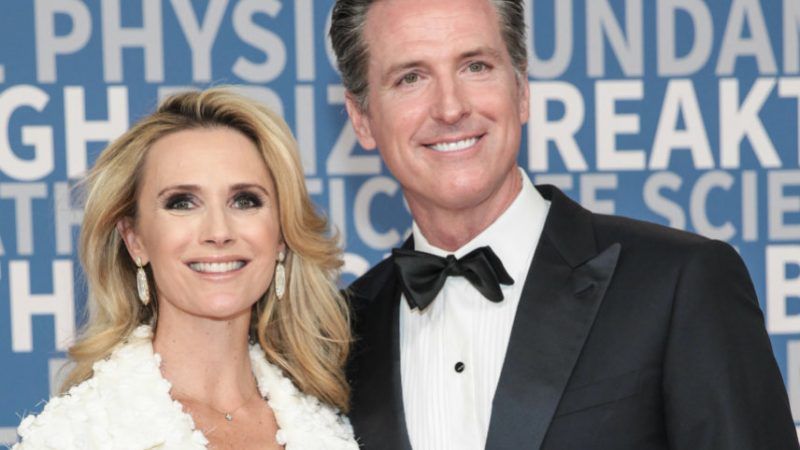Charter Schools Take Unnecessary Risk With Blistering Attacks on California Gubernatorial Frontrunner
If Lt. Gov. Gavin Newsom wins in November, will he punish charters for their efforts?

When it comes to politics, it's not always clear when to publicly blast a political opponent—or when to take a softer approach given the power that politician might one day exert over one of your priorities.
I was reminded of that conundrum recently. In these pages, I compared a state effort designed to crack down on "economic crimes" to something out of the Soviet Union. That bill's author, Sen. Cathleen Galgiani (D-Stockton) sits on a committee that on Monday heard an occupational licensing reform bill sponsored by my employer.
The opposing lobbyist actually referred to the offending column, but Galgiani nevertheless voted for the bill, which passed out of committee 6-1. Good for her. For all their flaws, most politicians have the integrity to vote however they are going to vote—not to spite their critics. At least that's my operating assumption.
Certainly, columnists and political activists have to call them as they see them, yet even I was taken aback by the harsh tone of an email sent out this week regarding the governor's race from a group that promotes charter schools. The California Charter Schools Association Advocates sent an email with a subject line calling Lt. Gov. Gavin Newsom an "unprecedented threat" and called for members to be "all in" for Democratic former Los Angeles Mayor Antonio Villaraigosa. The email includes a link to a video of one of its board members blasting Newsom in a talk.
It's not a surprise that a pro-charter organization would back Villaraigosa in the June 5 primary. Villaraigosa is a liberal Democrat with lots of baggage for those Californians who are on the more conservative side of things. He has called for limiting Prop 13's tax protections and has gained troubling union endorsements, but as mayor he admirably stood up to the teachers' unions and attempted to expand charter options for L.A. school kids.
Charters are publicly funded schools that provide an important alternative to the public-school monopolies, especially in low-income areas with notoriously troubled schools. They are indeed under attack by the bureaucracy and the teachers' unions, which fear the competition and the diversion of funds. The California Teachers' Association routinely runs bills designed to limit—or essentially kill—these alternatives, even though they can greatly improve the life prospects of poor kids.
On the last point, a 2014 Los Angeles court ruling known as the Vergara decision deemed the state's system of teacher job protections unconstitutional. It was later overturned by higher courts, but the case highlighted the large number of students subjected to ineffective teachers. Charters provide a way out. Fortunately, Gov. Jerry Brown has been a strong supporter of charters and has been a backstop against anti-charter bills.
The real surprise is that the group would view Newsom as an existential threat to the current order. He has received the CTA's endorsement, which always is problematic, but Newsom also has a reasonable record of supporting charter schools—including one for dyslexic kids—when he was mayor of San Francisco.
"Gavin Newsom's record on public charter schools is clear: successful charters thrived when he was mayor and they will thrive when he is governor," said Newsom's campaign manager, in a statement this week. "He fundamentally believes in their mission as engines of educational innovation." Newsom, however, "opposes the creeping for-profit privatization of public education" and "has reasonably suggested that new charter approvals should be temporarily paused until both sides of the debate achieve the consensus they both say they want on those minimal transparency measures."
We should be more concerned about the impossibility of reforming these massive school districts and the inability of districts to fire even the worst-performing teachers (search Google for "rubber rooms") than about "creeping for-profit" schools. But it's hard to view Newsom's record or his statement as particularly hostile to charters.
Perhaps the tough anti-Newsom rhetoric simply reflects a changing dynamic in the race. According to news reports, longtime charter-school advocates Reed Hastings of Netflix donated $7 million and Los Angeles philanthropist Eli Broad donated $1.5 million to boost Villaraigosa via independent expenditure committees.
"Hastings and Broad have pumped new life into Villaraigosa's campaign," wrote Los Angeles Times columnist George Skelton. There's no question about that. "And, despite the current cautious rhetoric, the race has become a proxy fight between teachers' unions and their charter school critics." But now the rhetoric is getting less cautious, with the charter group laying down the gauntlet and focusing attention on the debate over schooling.
The group raises some important points that should be debated in the campaign. But this brings us back to that initial dilemma about blasting political foes. The Newsom campaign says that the charter group's "hysterical hyperbole does a disservice to their members and to the overall public education policy discussion." According to recent polls, Newsom maintains a solid lead and still is the odds-on favorite to be California's next governor. If he wins, will he punish charters for their efforts? I tend to doubt it, but the heated rhetoric still seems unnecessarily risky.
This column was first published in the Orange County Register.
Steven Greenhut is Western region director for the R Street Institute. He was a Register editorial writer from 1998-2009. Write to him at sgreenhut@rstreet.org.


Show Comments (42)